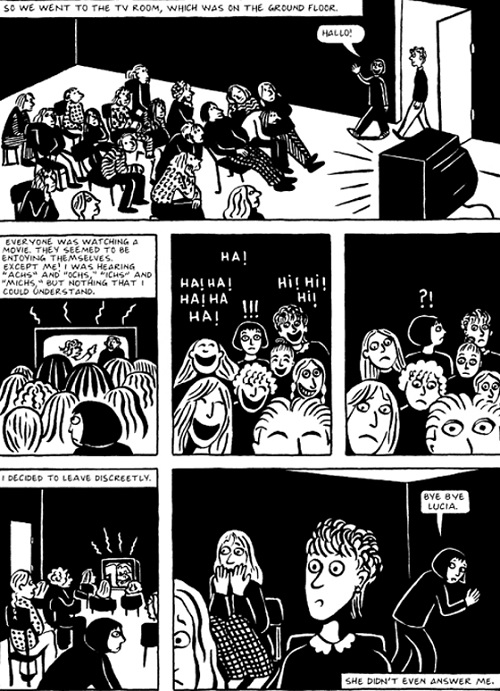
About the Book
-
Author:
- Marjane Satrapi
Cover Story: No Shame
BFF Charm: YAY! Wait Maybe? Okay Yay Again!
Talky Talk: Artful
Bonus Factors: Revolution, Memoir, Kickass Gram
Relationship Status: Cool Older Sister
Cover Story: No Shame
This cover isn’t quite indicative of the gorgeousness that lies within, but it still looks legit adult, possibly because this is one of those books about childhood and adolescence that exists in that weird graphic novel nether-land between YA and Adult literature. All this means that I can walk around with this book without feeling the need to hide.
The Deal:
Marjane Satrapi is growing up in the middle of the Iranian Revolution. She comes from a family of well-educated activists, so Marjane has very passionate opinions from a young age. Unfortunately, as the revolution turns on her family and so many other activists that helped bring it about, Marjane’s previously adorable declarations on politics and religion become less cute and more dangerous. What’s a parent of a precocious and intelligent child in the midst of the Islamic Revolution and the Iran-Iraq War to do? Ship your 14 year old off to Austria, of course!
Persepolis and Persepolis 2 recount Marjane’s childhood in Iran, very lonely adolescence in Austria, and eventual return to Iran in her late teens. This is a book about revolution, isolation, and history, and even though most of us won’t have to deal with half the shit Marjane goes through before her 13th birthday in our entire lives, the story is both poignant and relatable.
BFF Charm: YAY! Wait Maybe? Okay Yay Again!

Oh Marjane. You’ve been through so much; reading about your life is a serious emotional roller coaster. I loved little Marjane throughout the first book—you are so idealistic and passionate, so much so that your parents had to ship you off to Europe to keep your sharp tongue from getting you in too much trouble.
And then, you kind of lost your way in your teenage years. And it’s understandable—most teenagers go through a whiny phase where NO ONE UNDERSTANDS THEM, OKAY?—but you have an actual legitimate excuse, seeing what you saw back in Iran, living alone in Austria at age 14, not feeling like you belong either back home or in Europe. So even though I would like to stick with you through the drug years and the shitty boyfriends and those weird anarchist meetings, I think you probably would rebuff my friendship. But that’s ok, because by the end of your second book, I think we’re friends again? I hope we’re friends again.
Swoonworthy Scale: 2
Marjane has several romances during the course of her adolescence and young adult life (she even gets married!), but none of them are particularly romantic. This is partly due to the fact that this is a book about revolution, and there’s not really time for any of that. But mostly it’s because as a reader, you know from the get-go that none of these relationships will last. Marjane is kind of damaged, and she’s always with men for all the wrong reasons. It’s hard to feel tingly about anything, even if she does herself as it’s happening.
Talky Talk: Artful
I can’t talk about the language in this book without talking about the pictures. I LOVE the way Satrapi draws. Like the prose, it’s simple and understated and beautiful. Despite drawing exclusively in stark black and white, this book is all about the shades of gray of revolution, religion, war, love, and life in general.

Bonus Factor: Revolution

Revolution by itself is not a bonus factor because it can be pretty bleak. In Persepolis, we see not only how the Revolution changes a nation as a whole, but also affects lives on a deeply personal and individual level. Satrapi manages to put a humanizing spin on both the Islamic Revolution and Iran-Iraq war in the same way that Markus Zusak humanizes WWII Germany in The Book Thief. There are some really horrible humans out there, and then there are some really amazing ones as well. But most of us would fall with the masses–somewhere in between, where people are just trying to live as happy and fulfilling lives as they can, given their circumstances.
Bonus Factor: Memoir

All of this actually happened! At least, according to Marjane Satrapi it did. I’m inclined to believe her because frankly, she kind of sucks for a large chunk of the second book. If I were going to lie about my life for the pursuit of literary fame and fortune, I’d probably make myself more consistently likeable. Anyway, I love how this memoir weaves personal history in with national and international history, to the point where you will never think of the Islamic Revolution in the same light after reading this book.
Bonus Factor: Kickass Gram

Marjane’s grandmother is THE BEST. I can’t really explain here how awesome she is because it’s just going to get real weird when I start talking about how she puts jasmine flowers in her bra every morning and soaks her boobs in ice water each night, but whatever. She’s great! Take my word for it!
Relationship Status: Cool Older Sister
I really respect and look up to this book, even if I can’t always understand what it’s been through. I mean, this book has PROBLEMS. Problems that I, hopefully, will never have to face. So yeah, I’m not as cool as this book, and luckily, I’ve never had drug issues, been homeless, or lived through war. Which is exactly why this book probably sees me as an annoying, naive little sister always tagging along. But even though this book and I will never fully get each other, I still love it with all my heart.
FTC Full Disclosure: I received neither money nor cocktails for writing this review (dammit!). The Complete Persepolis is available now.